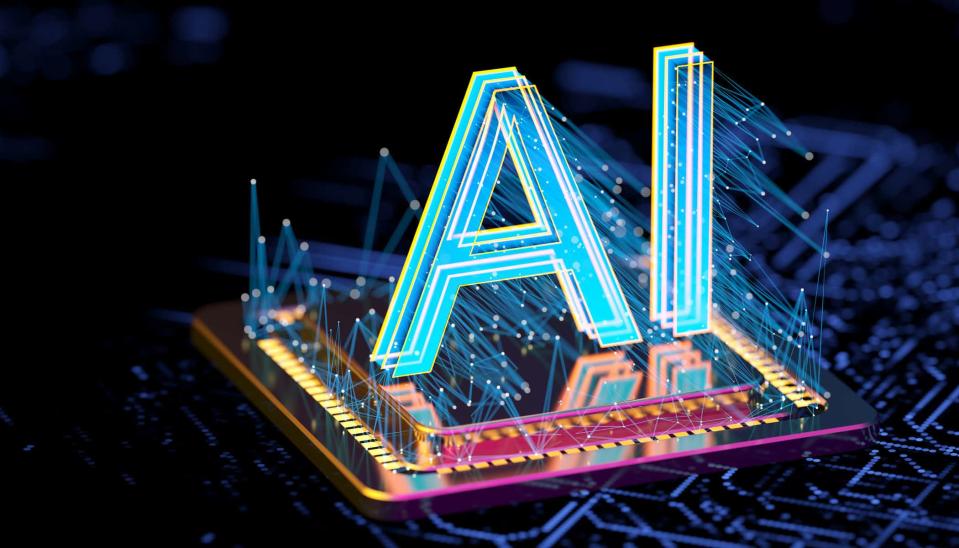Surprise! Brookfield Renewable Stock Is an AI Play

Written by Aditya Raghunath at The Motley Fool Canada
The AI (artificial intelligence) megatrend is here to stay, as a report from Precedence Research forecasts this market to expand from US$454 billion in 2022 to US$2.6 trillion in 2032, indicating an annual growth rate of 19%.
Due to a rapidly expanding addressable market, investors are bullish on companies such as Nvidia, which sells chips to power AI platforms. Further, early movers in the AI segment, such as Microsoft, have also generated outsized gains in the past 18 months.
However, clean energy companies such as Brookfield Renewable (TSX:BEP.UN) are also positioned to benefit from rising AI demand. Let’s see how.
Energy demand is forecast to rise
Energy producers are planning for a spike in demand in the upcoming decade as AI platforms such as ChatGPT continue to gain popularity. According to Wells Fargo electricity demand in the U.S. is expected to grow by 20% through 2030 after a decade of flat power growth.
The investment bank emphasized that AI data centres in the U.S. are forecast to add 323 terawatt hours of electricity demand by the end of 2030. It indicates that power demand from AI might be seven times greater than the annual electricity consumption of New York, which is roughly 48 terawatt hours. Moreover, Goldman Sachs expects data centres to account for 8% of electricity consumption in the U.S. by 2030.
This power demand surge will pose a challenge to big tech companies such as Meta, Microsoft, Alphabet, and Amazon, all of which are looking to power data centres with clean energy. Alternatively, it provides renewable energy giants such as Brookfield Renewable a chance to benefit from a sizeable secular tailwind.
Brookfield partners with Microsoft
Last month, Brookfield Renewable announced it signed a global renewable energy framework agreement with Microsoft as the tech heavyweight aims to have 100% of electricity consumption matched by zero carbon energy purchases by 2030.
The agreement will mean Brookfield will deliver more than 10.5 gigawatts of new renewable energy capacity south of the border between 2026 and 2030. Moreover, the agreement may expand to deliver additional renewable energy capacity in the U.S. and other international markets. So, it incentivizes Brookfield to build a large portfolio of new clean energy projects in the upcoming decade.
Microsoft explained that the partnership would provide it with access to new renewable energy capacity to support the rising demand for cloud services. This will contribute to the decarbonization of the grid and accelerate the shift to cleaner energy solutions.
Brookfield Renewable’s chief executive officer Connor Teskey stated, “As the global trend of digitalization and the adoption of AI continues to drive growth in demand for electricity, we are thrilled to collaborate with Microsoft to support their customer demand with the build-out of over 10.5 gigawatts of renewable energy capacity.”
The agreement will be a key driver for Brookfield going forward, as it is almost eight times larger than the largest single corporate power purchase agreement it has signed to date.
While most AI stocks trade close to all-time highs, Brookfield Renewable stock is down 40% from record prices, allowing you to buy the dip and benefit from outsized gains over time.
The post Surprise! Brookfield Renewable Stock Is an AI Play appeared first on The Motley Fool Canada.
Should you invest $1,000 in Brookfield Renewable Partners right now?
Before you buy stock in Brookfield Renewable Partners, consider this:
The Motley Fool Stock Advisor Canada analyst team just identified what they believe are the 10 best stocks for investors to buy now… and Brookfield Renewable Partners wasn’t one of them. The 10 stocks that made the cut could potentially produce monster returns in the coming years.
Consider MercadoLibre, which we first recommended on January 8, 2014 ... if you invested $1,000 in the “eBay of Latin America” at the time of our recommendation, you’d have $17,363.76!*
Stock Advisor Canada provides investors with an easy-to-follow blueprint for success, including guidance on building a portfolio, regular updates from analysts, and two new stock picks each month – one from Canada and one from the U.S. The Stock Advisor Canada service has outperformed the return of S&P/TSX Composite Index by 26 percentage points since 2013*.
See the 10 stocks * Returns as of 6/3/24
More reading
Can You Guess the 10 Most Popular Canadian Stocks? (If You Own Them, You Might Be Losing Out.)
How to Build a Bulletproof Monthly Passive-Income Portfolio in 2024 With Just $25,000
Suzanne Frey, an executive at Alphabet, is a member of The Motley Fool’s board of directors. John Mackey, former CEO of Whole Foods Market, an Amazon subsidiary, is a member of The Motley Fool’s board of directors. Randi Zuckerberg, a former director of market development and spokeswoman for Facebook and sister to Meta Platforms CEO Mark Zuckerberg, is a member of The Motley Fool's board of directors. Wells Fargo is an advertising partner of The Ascent, a Motley Fool company. Fool contributor Aditya Raghunath has positions in Brookfield Renewable Partners. The Motley Fool recommends Alphabet, Amazon, Brookfield Renewable Partners, Goldman Sachs Group, Meta Platforms, Microsoft, and Nvidia. The Motley Fool has a disclosure policy.
2024

 Yahoo Finance
Yahoo Finance 